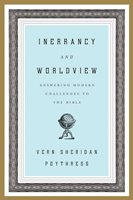Vern Sheridan Poythress (PhD, Harvard University; ThD, University of Stellenbosch) is professor of New Testament interpretation at Westminster Theological Seminary in Philadelphia. The author of many books he is well known for his careful scholarship and inter-disciplinary learning. His Inerrancy and Worldview: Answering Modern Challenges to the Bible (Crossway, 2012) takes up the question of inerrancy in largest perspective. It is not your usual book on inerrancy, so we asked if he would talk to us about his work.
Books At a Glance (Fred Zaspel):
Let’s start at the bottom. What is “worldview”? And can you give us a brief, general characterization of the worldview that prevails in our society?
Poythress:
A worldview consists in a person’s most basic assumptions about the nature of the world. It provides answers that help to orient us. Is there a God? What kind of God is he? Who are we as human beings? What kind of world do we live in? Is it all matter and motion or is there more? Is there purpose in the world or in us? What is the source of morality? What happens after death? Some people spend a lot of conscious effort trying to obtain answers to such questions. But many other people unconsciously accept assumptions from the culture around them, without thinking everything through. They hold a worldview without realizing it.
What worldviews occur in modern society? In a sense there are many worldviews, in accord with the pluralism that characterizes much of modern life. In my book I focus attention on the contrast between two broad worldviews, the impersonalism characterizing much in modern culture and the personalistic worldview described in the Bible. God who is personal is at the heart of the biblical worldview. God made us as persons, and he made everything around us in accord with his personal purposes.
By contrast, materialism says that the world is basically physical in its nature: it consists in matter and energy and motion. Materialism is a form of impersonalism, because it implies that at its root the world is impersonal. It is a pretty grim picture of the world. It has some vocal advocates, but many other people are influenced by it without adopting it completely. For example, humanists have human beings at the center of their picture, but ultimately human beings can still be viewed as complex arrangements of matter and motion. According to this view, we as human beings invent purposes and meanings for ourselves, but the environment around us is still impersonal, and in the end we ourselves are built up from impersonal beginnings with matter and motion. That is still a form of ultimate impersonalism.
The point in thinking about worldviews is to observe that assumptions about an ultimate personalism or impersonalism have subtle but vast effects on how we treat the Bible and how we evaluate claims about its truthfulness.
 Books At a Glance:
Books At a Glance:
Briefly (if this can be answered briefly!), how or why would you argue that only the biblical worldview is self-consistent and able to account for the world as it is?
Poythress:
God continually reveals himself and his character in what he has made (Rom. 1:18-23). Our own constitution, as people made in the image of God, bears witness to God. We cannot escape this reality. We continually rely on God in our thinking, our work, our conduct, and our sense of morality.
The issue of ethical standards is a particularly revealing one. It is difficult to make sense of how ethical standards are actually binding, unless they originate in the character of God. If there are no ethical absolutes, there is no way to judge what people ought to do to pursue knowledge. Human knowledge threatens to disintegrate. In practice, people still rely on standards, as these are manifested in conscience. They rely on God, but they also make substitute accounts by telling themselves, for example, that the standards are impersonal.
Books At a Glance:
Okay, how does worldview bear on the specific question of inerrancy?
Poythress:
If a person with an antibiblical worldview examines and reads the Bible, he finds many difficulties and seeming impossibilities and “errors” in the Bible. He finds errors not because the Bible actually has errors but because antibiblical assumptions affect his reading of the Bible. It is easy to illustrate the process with respect to miracles in the Bible. According to a modern materialistic or impersonalistic worldview, we live in a world of matter and motion, governed by inviolable scientific laws of a mechanistic kind. There can be no exceptions. So there can be no miracles. A person thinking this way will conclude that miracles in the Bible are instances of erroneous reporting.
But the Bible itself reports miracles within the context of a personalistic worldview, according to which God governs the world both in its regularities and in the exceptions (miracles). Miracles make perfect sense within a biblical worldview. They do not make sense within an impersonalistic worldview, and so they appear to be errors.
Books At a Glance:
Where does the strongest challenge to inerrancy come from today (e.g. linguistics, history)?
Poythress:
For most ordinary people living in Western cultures, I think the strongest challenge comes from pronouncements made in the name of science – that is, physical science. I say “pronouncements” because the actual situation in professional work in sciences is complicated. Real sciences always includes disagreements among scientists. There is always the theoretical possibility that radical revision of scientific theories will take place at some time in the future. There are always philosophical assumptions and worldview assumptions that operate in the background in support of scientific practices, but which most practicing scientists never inspect. In addition, popular claims in the name of science simplify and often import impersonalistic assumptions about scientific law. Among other things, these imported assumptions lead to inferring the impossibility of miracles.
The average person is not aware of all this background. He feels that he just has to accept the pronouncements without question. In addition, many people are aware of the apparent discrepancies between the Bible and mainstream scientific claims concerning the days of creation and Darwinian evolution. It is tempting for people just to dichotomize their life: they think that the Bible is valuable only when it addresses “religious” issues in a narrow sense, while science rules in “real life.” That stance denies inerrancy in practice.
I address these problems in one section of my book, in order to give concise guidance about how to use an awareness of views to solve problems. But the problems with respect to science are so challenging that they could take up a whole book by themselves. So in the present book about inerrancy, I direct people to an earlier book (Redeeming Science) for fuller treatment.
There is another major challenge to inerrancy that I should mention. For Bible scholars, I think that the most serious newer challenge comes from cultural anthropology and related social sciences. Social scientific study tacitly includes in its methods the attempt to exclude God, to treat God as if he were absent. Religion, of course, is there in human life and is subject to scientific study, but it is viewed as a merely human social phenomenon, one among many. This foundational decision – a worldview influence – leads in the long run to treating language and culture as “closed boxes” from which human beings can never escape. When people apply this framework to the Bible, the books of the Bible are treated as trapped in the cultures in which they originated. The Bible can never really rise above what is possible within the “box” of culture, and those possibilities are always human, always prosaic, never divine. So the Bible is drained of its transcendent claim to be the very voice of God. When people experience this kind of drain on transcendence, inerrancy is not directly disproved but is abandoned because it does not make sense – it seems to be a denial of the cultural embeddedness of the Bible that scholars can observe on nearly every page.
Bible scholars as intellectuals naturally want to use whatever “tools” have become available for the study of human society. But the main tools belong to a worldview; they are not religiously neutral, though they often claim to be. The approaches in social sciences deny at the outset the presence of God in the natural world and the human world. As a result of this early, invisible denial, they become frameworks within which inerrancy cannot survive. Christians end up having to reconstruct critically the entire body of social-scientific, historical, and literary research to avoid the process of “trapping” the Bible in culture that is conceived of as a closed box.
Note:
Click here to see part 2 of our interview with Dr. Poythress.

